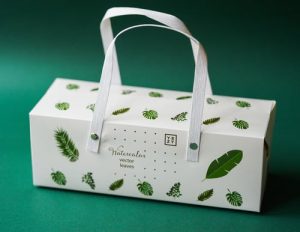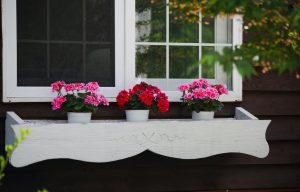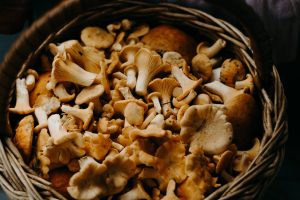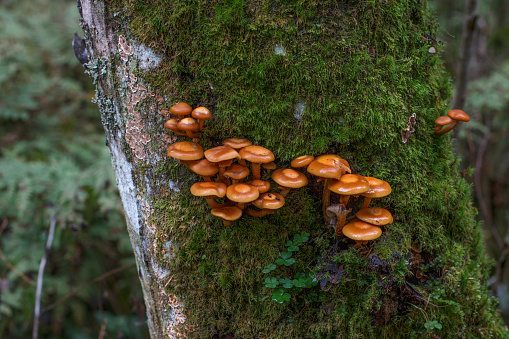Key points
- South African start-up Mycominded is working with fungi and developing organic alternatives to plastics.
- The goal is to come up with products that are biodegradable in a way that feeds the soil and turns into good compost.
- The company also works to educate people about the kingdom of fungi which is so important for ecosystems.
AfricaLive: Please tell our readers about the identity of your organisation.
Scone Bekker: Our company is called Mycominded and we study fungi.
We study fungi to help us solve some of the world’s problems. A major focus for us is plastic replacement, particularly stiff plastics like polyurethane. We look at plastics that have very short-use lives but stay in waste dumping areas for centuries.
We are working to come up with an organic replacement for these plastics that occupy landfills for centuries. The goal is to come up with products that are biodegradable in a way that feeds the soil and turns into good compost.
This allows us to also work on ecosystem restoration by fixing soils that have been degraded due to long-term mono-cropping, use of harmful chemical fertilizers and desertification. We study the soil to see what can be grown there and how we can rehabilitate those soils.
Our company also works in education to sensitise people about the kingdom of fungi which is so important for ecosystems. Fungi is an entire kingdom of equal importance to the plants and animal kingdoms but we have only recently started to value it in this way.
We grow gourmet mushrooms, as well, that offer great nutrition. We teach people how to grow these and also which kinds are safe for consumption.
AfricaLive: Most of us are now aware of the problems that single use plastics bring.
How can working with fungi provide a solution to this?
Scone Bekker: We (humans) produce a million plastic water bottles per minute. Bottled water is the product with this highest price markup, I believe only behind cinema popcorn.
Packaging is the biggest challenge that we have because a lot of polystyrene is used. Polystyrene is a scourge on the planet leaving a huge environmental footprint.
We use this compound so much when you can literally go into the forest and find a mushroom species that can be cloned and potentially grown in perpetuity into materials that can fill that gap.
Other valuable plant species and natural products that can be put to use are sorghum, straw, and woodchips.
We can also inoculate mycelium and have it grow on oak in a moulded shape that can be put through a curing and drying process. We would then end up with a material that can be lightweight, strong, sustainable and in some cases porous. Such materials can be used to filter water, package products and create crates to hold goods.
Our primary business model is as a private company that focuses on plastic replacement. We are in talks to separate the business activities and educational aspects by creating an NGO. Not all of our activities are focused on making a profit, this initially was an initiative born out of passion to reduce global reliance on plastics.
AfricaLive: Would you say that your products and activities need to form part of wider system change in our society?
Scone Bekker: Yes. If you look at the takeaway plastic material you take home, that material gets tossed in the bin and ends up in a landfill where it lasts for centuries. Electronics that are produced in the far east take about three months to reach customers here while the non-biodegradable material that makes them lasts for centuries.
This is a problem that has to be looked at. Sweden has made headway in getting rid of waste by incinerating it to produce energy. They have gone as far as buying waste from other countries to help produce more energy. Sweden is making the right moves, but it is still far better to not have to do that level of waste in the first place.
Exposure to light can help break down these plastics but the challenge is that we dump them in anaerobic environments such as landfills. One of the landfills we visited here in Capetown receives about 4200 tons of waste per day. We are not creating landfills anymore; we are literally building mountains of trash.
The point is there are better ways to deal with waste and our job is to raise awareness.
It is also important that we distinguish between price and cost. The market determines the price but cost is the total picture of what it costs the planet, and entails considering all the factors that are in play as we work to come up with plastic replacements.
AfricaLive: It can be overwhelming for many people when they look into the scale of environmental challenges facing us.
We also have a situation where many well-meaning people focus on the issue of plastic bags while not looking at the larger issues which are leading to climate breakdown.
On the issue of educating people, do you approach as a gateway to educating people on issues such as the soil and water health and the possibility of landscape regeneration?
Scone Bekker: It is true that people are aware of some things and not others. Our work is definitely a gateway to wider education. As long as we have a solid grassroots movement, the public will start demanding changes. We must also start conversations with the authorities and not just wait for a grassroots uprising. Our message is well received and people are happy to hold these plastic replacement solutions in their hands.
When it comes to economic viability, it needs to reach economies of scale. In terms of education, we do our best to impart the right ideas but our work will be cemented by people buying the right products when they go shopping. Getting rid of single-use plastic problems is a marathon, not a sprint.
AfricaLive: We like to look at the impact of projects in three areas: economic, social and environmental.
There is a clear environmental impact to this project of course.
Scone Bekker: Yes, it is hard to quantify but our project is geared towards reducing reliance on plastics as well as land regeneration. Here in Cape Town, farmers have to use a lot of chemical fertilizers that go through the soil quickly and end up polluting river systems.
We mitigate this through soil restoration and finding healthy sustainable solutions through marketable products that can be turned into compost. We are working on this with our respective partners and we expect the impact to be huge in the long run.
AfricaLive: You mentioned economies of scale as far as your products, what is the current scale of the project and how far could it possibly go?
Scone Bekker: It is still slow but we are progressing. We have had challenges of near theft of intellectual property as well as other challenges that have slowed us down. We are organizing a few prototypes for potential clients to get our plastic replacement site back on track.
We have had discussions with the Industrial Development Corporation (IDC) which is the public arm of the Department of Trade and Industry. They were keen to fund us but the fine print of their offer was a little bit sketchy, so we ended up declining that offer.
We want to find the right offer with the correct private funders that have a long-term view. A positive bottom line is always great, but changing the planet is the main focus for us.
Some of our potential clients are big distributors with shops across South Africa. We have also worked with a few firms that ship internationally. All these big potential clients are soliciting our services because they have come across the idea of sustainable packaging or they have come across some of the work we do.
On the one side, there is this awareness shift taking place. However, on the other side there can be a much bigger change if producers open their eyes to the fact that this can be done.
When it comes to the financial side of things we should be open to government subsidies. We are at the point where a lot of consumers can pay a little extra to ensure the packaging is sustainable. This is hard to do in a country where most people live under the breadline. I am positive that with time our solutions will become available to everybody.
A business like this can increase in impact as we continue to grow. One of our ultimate goals is restoring the Olifants River in Kruger National Park which has been highly damaged by all the mining projects in its environs. The river that passes in the middle of it has been contaminated by toxins over the years and we hope to make an impact there. If our process moves along like we expect, we can help filter that river and restore the entire ecosystem that relies on it downstream.
AfricaLive: Looking at the economic impact. What are the opportunities for job creation that arise with this?
Scone Bekker: Fungi is all around us and there is a lot of work involved in our production processes. This means that there is the opportunity for a lot of low skill labour and further along in the process, high skill labour. We also want to share knowledge and that can happen through setting up satellite institutions and helping people earn a living wage through that.
We live in a country with a lot of hardship and informal settlements. We can use our partnerships to find solutions that provide better shelter while also providing gainful employment. People can learn how to grow mushrooms for their own consumption through our initiative so that they can grow their own food. This can be done in a very low cost and low-risk environment.
AfricaLive: We would love to help you find the right partners to take the business to the next level.
What is the main message you would like to communicate to international academic and investment communities at this time?
Scone Bekker: My message would be to stress that change is enviable and due.
When the international media reports on South Africa there is a lot of Afropessimism and I find it frustrating. This is a place where world-class research is being done with excellent research & development programmes going on. There is a lot of human capital here and good things are happening.
We have to change from our addiction to comfort because it is putting the planet in jeopardy. Small changes are necessary and due in order to keep our planet safe.
Looking to the future of Mycominded, we are looking for the right partners to join us in our efforts. The right partner is not someone looking for a quick buck, but one who believes in our work and is willing to ride along with us long-term. As much as we want to achieve our goals as soon as possible, we have to be selective with our choice of partner to ensure sustainable success.
We work to produce useful and economically viable products.
We are creating an alternative to polystyrene by creating packaging for bulk or bespoke products. 
We are also replacing plastics by creating planter pots, surfboards, and water filters. 
We are also replacing chemical and mechanical Carbon Dioxide production systems using fungi, while also delivering gourmet edible mushrooms like enoki and shiitake. 
We work with mycelium because it has a host of great uses. There is potential for creating building materials for our growing construction industry. Mycelium is ideal for this because the building materials will be lighter, stronger and fire resistant.
It can also be used to make bonding agents for the same industry. It can be used in the fashion industry as well to mimic the look, texture, and utility of leather.

